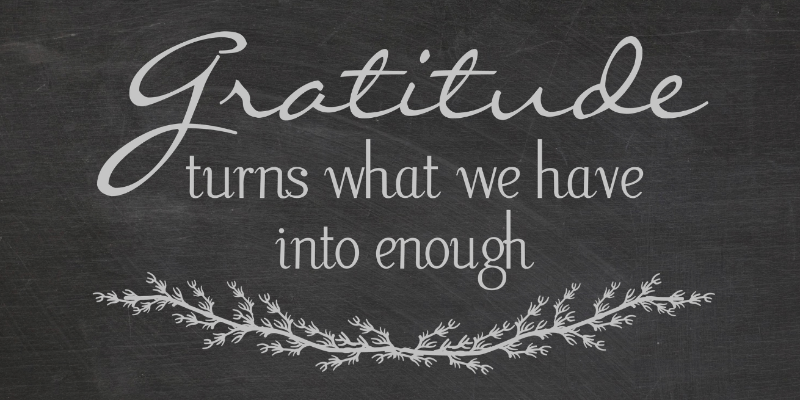Gratitude

The stories we tell ourselves in our head often lead to how we see or perceive things. Last week, I spent over an hour talking to a friend about how she sees her life. She has a story of her life that she regularly tells herself. And from what I know of her and what she’s told me, I think there is a different way she can tell her story, which is the opposite of how she currently tells it. But which story is true? They can both be true, but one is definitely told from a more grateful heart.
If you know her story, you’ll agree she’s had a very rough life, rougher than many of us. However, God has been good to her. She is married to a loving and God-fearing man who adores her. Together they have a handsome and intelligent son of primary school age. She and her husband both have well paid jobs and own their own house.
They’d like to have more children, but due to age and medical conditions this is highly unlikely, though not impossible. This issue, though not the only issue, is the primary influence behind the story she tells herself. The story she tells herself goes something like this… "I've had a tough life and it continues to be tough. I thank God for his mercies, but why do I have to struggle for everything in life. Why is life so unkind to me? How I wish this, how I wish that…"
Knowing her well enough, I told her the story she tells herself should be something like this… "My life has been tough, nothing has come easy, but I thank God for his grace and mercy. Though I’d love more children, I am so grateful to God that the one he has given me is more than enough. I trust God that this one will grow up to have many children and I pray I live long enough to see my great grandchildren."
The crux of my counsel to her was that gratitude makes what we have enough. If you define your life largely by “things” you are pursuing, you’ll never have enough, even after you get what you seek. You’ll simply replace it with another “thing”, the next “thing” to pursue. A grateful heart thinks more about what they have and are thankful for it. They know that things could be worse. They look back and thank God for how far they have come, they don’t look forward and despair about far they need to go.
Gratitude is not the lack of ambition or a desire for betterment. It is the language of a contented heart. If we are grateful for little, when something big comes we will be even more grateful. Not so a heart always wanting more.
In Luke 17, we read Jesus’ encounter with ten lepers: “When he saw them, he said, “Go, show yourselves to the priests.” And as they went, they were cleansed. One of them, when he saw he was healed, came back, praising God in a loud voice. He threw himself at Jesus’ feet and thanked him – and he was a Samaritan” (Luke 17:14-16, NIV).
Could Jesus be teaching us here that many of us are not as grateful as we should be? Is it possible that only ten percent of us have cultivated a heart of gratitude? As many of you know, we’ve just moved house, and often when I go on my walks I look at different houses. Once, I found my heart straying, desiring a beautiful house I saw. I had to call my heart to order. It’s so easy to slip into the worldly mentality of always wanting more - The grass is greener syndrome.
The Samaritan leper went back to Jesus when he saw he was healed. The nine others didn’t. If we hazard a guess as to why the nine did not come back, we may come up with things like: self-centredness; lack of gratitude and so on. I suspect, it could also be, the story they tell themselves… "If and when I get healed, I will do this, I will do that." A story focused on possibilities after the healing experience.
But for the Samaritan leper, I think the story he told himself went something like this… "If and when I get healed, I will spend a moment to say thank you to anyone responsible, I’ll look back and be grateful for my healing." I think that’s why he went back. It wouldn’t surprise me if he then became a follower of Jesus.
Jesus said “Were not all ten cleansed? Where are the other nine? Has no one returned to give praise to God except this foreigner?” (Luke 17:17-18, NIV). This shows that Jesus expected all ten to come back to give thanks to God. He expects us to be thankful for what he has done in our lives.
How thankful are we? How grateful are we? Does our prayer life revolve around only the things we don’t have, or are they also full of gratitude for the things we do have? May our lives not revolve around seeking “things”. May we learn to seek the kingdom, not “things”. God will add “things”, ours is to seek Him.
In a blog on gratitude, Clarissa Moll referred to what Charles Spurgeon said in one of his preaches: “I have a great need for Christ: I have a great Christ for my need.” And for those who really struggle to find anything to be grateful for, Moll cited the Psalmist: “I remain confident of this: I will see the goodness of the Lord in the land of the living” (Ps. 27:13).